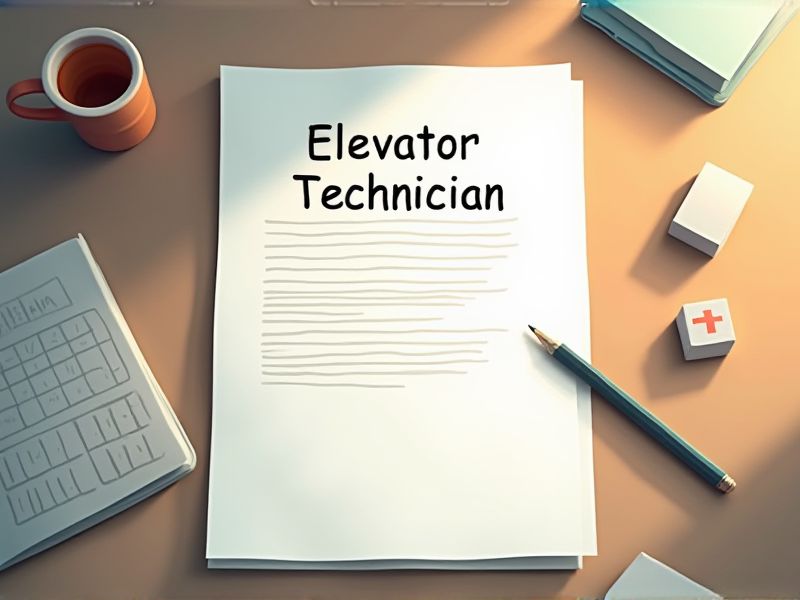
Elevator technicians work in a highly specialized field where safety and precision are paramount. The complex systems and technologies used in modern elevators necessitate a thorough understanding of mechanics, electronics, and safety regulations. Certifications ensure technicians possess the necessary skills and knowledge to install, maintain, and repair elevators in compliance with industry standards. Here are some important certifications you may need as an Elevator Technician.
National Association of Elevator Contractors (NAEC) Certification
The National Association of Elevator Contractors (NAEC) certification ensures that elevator technicians meet industry standards for safety and reliability. It provides technicians with up-to-date knowledge on evolving technologies and regulations within the elevator industry. Employers are more likely to hire certified technicians, as it lowers the risk of accidents and liabilities. Certified technicians typically command higher salaries, as their skills and knowledge are formally recognized.
National Elevator Industry Educational Program (NEIEP) Certification
NEIEP Certification ensures elevator technicians have the necessary skills and knowledge to safely install and maintain complex elevator systems. This certification elevates the standard of workmanship, reducing the risk of accidents and malfunctions. Employers often require NEIEP Certification, aligning with industry standards and legal compliance. Certified technicians typically command higher wages, reflecting their verified expertise and competence in the field.
Elevator Constructors Training Institute (ECTI) Certification
Elevator Constructors Training Institute (ECTI) Certification is needed as it ensures technicians possess the latest knowledge about elevator systems' safety standards and technology. Certified technicians demonstrate proficiency in industry-specific tools and troubleshooting methods, reducing the risk of equipment malfunctions. The certification enhances a technician's credibility, leading to increased employment opportunities and professional growth. Employers often prefer certified technicians, as it assures quality workmanship and adherence to regulatory compliance.
OSHA 10-Hour Safety Certification
Elevator technicians face various hazards such as falls, electrical shocks, and equipment malfunctions. OSHA 10-Hour Safety Certification provides the foundational safety training crucial for recognizing and mitigating these risks. Increased safety awareness leads to fewer on-the-job accidents and injuries. Employers benefit from reduced liability and compliance with occupational safety standards.
OSHA 30-Hour Safety Certification
The OSHA 30-Hour Safety Certification provides in-depth knowledge of workplace safety standards, which is crucial for elevator technicians due to the high-risk nature of their tasks. Possessing this certification can significantly reduce accident rates, as technicians are better informed on how to handle hazardous situations effectively. Employers often require this certification to ensure compliance with federal safety regulations, thereby minimizing potential legal liabilities. Properly trained technicians contribute to maintaining operational efficiency, as reduced injuries mean less downtime for repairs and maintenance.
Lockout/Tagout (LOTO) Certification
Elevator technicians work in environments with high electrical and mechanical risks; LOTO certification ensures they adhere to safety protocols by controlling hazardous energy sources. Proper training and certification in LOTO significantly reduce the likelihood of accidental machine startups during maintenance, protecting technicians from severe injuries or fatalities. Regulations mandate LOTO certification to comply with Occupational Safety and Health Administration (OSHA) standards, ensuring workplace safety and legal compliance. With LOTO certification, technicians are more likely to follow systematic procedures that enhance overall operational efficiency and safety in elevator maintenance and repair.
National Electrical Code (NEC) Certification
The NEC Certification for elevator technicians ensures that they adhere to safety standards, reducing the risk of electrical fires. Compliance with the NEC helps prevent code violations, which can lead to costly fines and legal issues for companies. When technicians understand the NEC, they can effectively troubleshoot and repair elevators, minimizing downtime for building operations. The certification strengthens trust with clients and employers, reflecting a commitment to professional and safe work practices.
CPR and First Aid Certification
Elevator technicians often work in environments with potential hazards, and CPR and First Aid certification equips them with crucial skills to handle emergencies. Immediate medical response can significantly increase the chances of survival during on-site accidents. Certification enhances technicians' safety, building trust with employers and clients. This training aligns with industry standards, promoting a safer work environment.
Fall Protection Certification
Elevator technicians often work at heights, and fall protection certification ensures they understand safety protocols to prevent accidents. When a technician is certified, their ability to handle fall arrest systems and harnesses properly is enhanced, thus reducing workplace injuries. Employers are likely to meet safety regulations and lower insurance costs when technicians are certified. Certified technicians also contribute to a safety culture, promoting consistent adherence to protocols and reducing liability risks.
Confined Space Entry Certification
Confined Space Entry Certification is necessary for elevator technicians because they frequently work in tight, restricted areas where standard ventilation may be inadequate. These spaces pose significant risks such as limited oxygen or harmful gases, which the certification helps technicians recognize and manage. Proper training ensures they're aware of potential hazards and how to safely navigate these environments. This certification minimizes the risk of accidents, enhancing overall safety in the workplace.
Summary
When you obtain certifications as an Elevator Technician, your expertise in handling complex machinery and safety protocols becomes more recognized. Employers may perceive you as a more valuable asset, leading to increased job opportunities and potential for career advancement. With certified skills, you likely ensure higher safety standards and efficiency in elevator maintenance and repair. Customers may trust your service more, resulting in stronger professional relationships and business growth.
